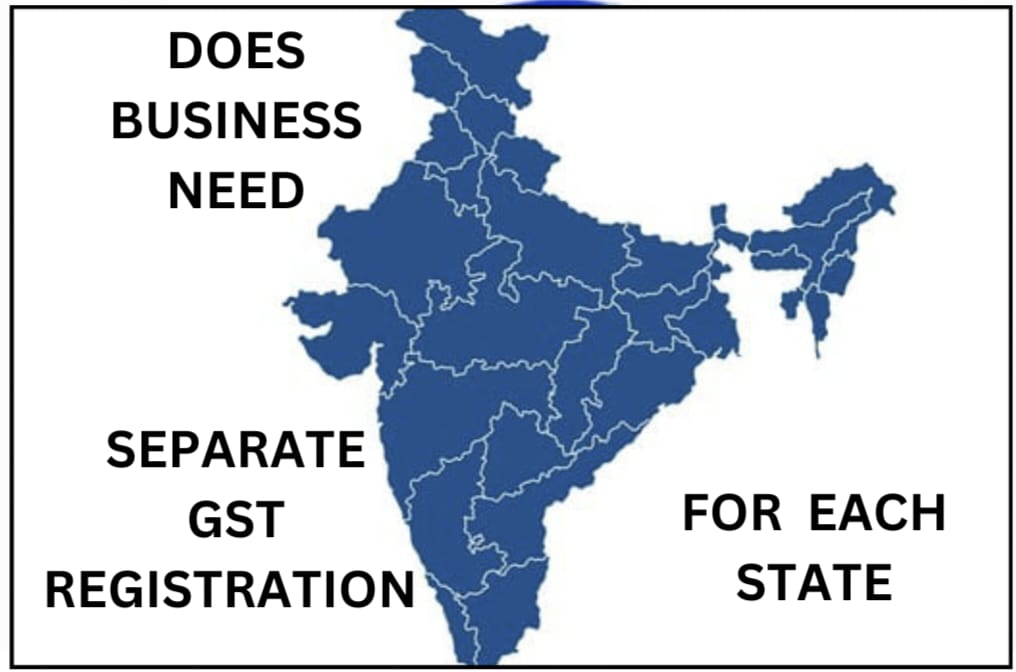Does business need separate GST registration for each state
The Goods and Services Tax (GST) regime in India has
brought about significant changes in the way businesses operate, particularly
when it comes to compliance and tax registration. One of the most frequently
asked questions is whether a business needs to obtain separate GST
registrations for each state in which it operates. Here, we delve into the
specifics of this requirement, supported by legal provisions and practical
examples.
Key Provisions Under GST Law and Scenarios Requiring Multiple GST Registrations
Key
Provisions Under GST Law
1. Section 22 of the CGST Act, 2017:
As
per Section 22, a person is liable to be registered in the state or union
territory from where they supply goods or services. This implies that GST
registration is state-specific.
2. Place of Business:
Each
state where a business has a fixed establishment, such as a branch, warehouse,
or office, requires a separate GST registration.
3.
Mandatory Registration Thresholds:
·
For
goods: ?40 lakh (?20 lakh for special category states).
·
For
services: ?20 lakh (?10 lakh for special category states).
If a business crosses these thresholds in a specific
state, registration becomes mandatory in that state.
Scenarios
Requiring Multiple GST Registrations
1.
Supply from Multiple States:
If
a business has operations in multiple states, such as warehouses in
Maharashtra, Tamil Nadu, and Gujarat, it must obtain separate GST registrations
for each state.
2. E-commerce Operators:
E-commerce
businesses operating across states often need state-wise registrations, especially
if they have warehouses or offices in different states.
3.
Different Business Verticals:
Under
Section 25 of the CGST Act, businesses with distinct verticals within a state
can opt for separate GST registrations for each vertical.
4. Interstate Supply:
Even in the absence of a physical presence,
businesses engaged in interstate supply of goods or services need to be
registered in the state where they deliver.
Benefits of State-wise GST Registration, Challenges of Multiple GST Registrations and Recent Updates and Data
Benefits
of State-wise GST Registration
1.
Compliance with State Laws: Ensures adherence to
state-specific GST laws and rules.
2.
Ease of Operations: Simplifies invoicing, tax payment, and
filing processes for state-specific transactions.
3.
Input Tax Credit (ITC): Enables smooth ITC claims for
transactions conducted within the state.
4.
Avoiding Penalties: Helps businesses avoid penalties and
interest for non-compliance.
Challenges
of Multiple GST Registrations
1.
Increased Compliance Costs: Filing separate GST returns
(GSTR-1, GSTR-3B, etc.) for each state.
2.
Complex Accounting: Managing state-specific ledgers and
reconciliations.
3.
ITC Reversal Risks: Mistakes in state-wise ITC claims can
lead to reversals and penalties.
Recent
Updates and Data
1.
GSTN Simplification Initiatives:
The GST
Network (GSTN) is working on enhancing features to ease compliance for
businesses with multiple registrations, such as auto-population of data across
states.
2.
Data on Multi-State Registrations:
As per GSTN
reports (2023), over 25% of GST-registered entities have registrations in
multiple states, highlighting the prevalence of multi-state operations.
Conclusion
For businesses operating in multiple states,
separate GST registrations are often mandatory. While this ensures compliance
and smooth operations, it also adds to the administrative burden. Businesses
must weigh the benefits of operational ease and legal compliance against the
challenges of increased paperwork and costs. Staying updated on GST rules and
leveraging technological tools can help streamline the process and ensure
hassle-free compliance.






